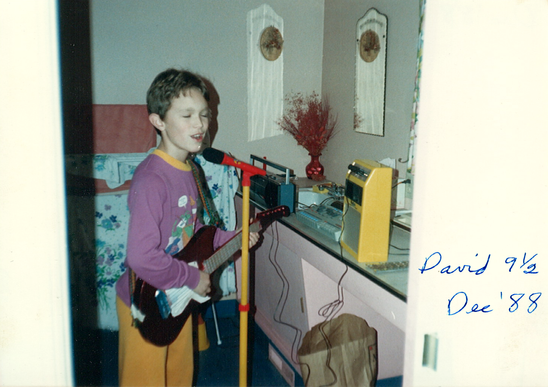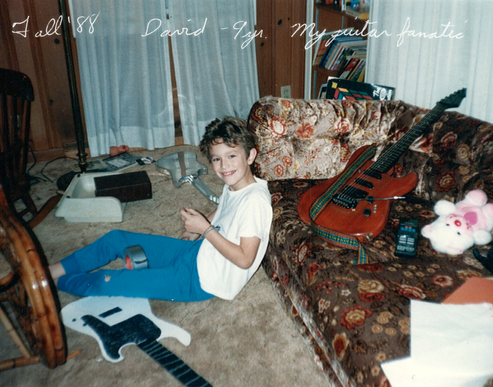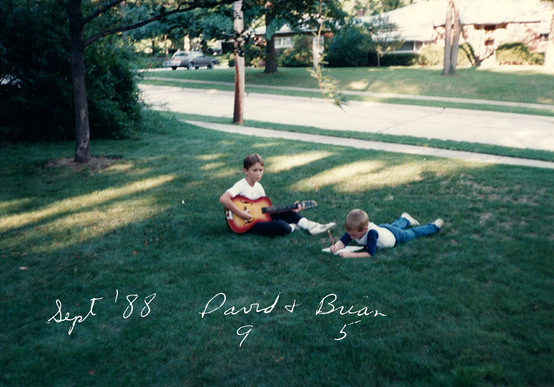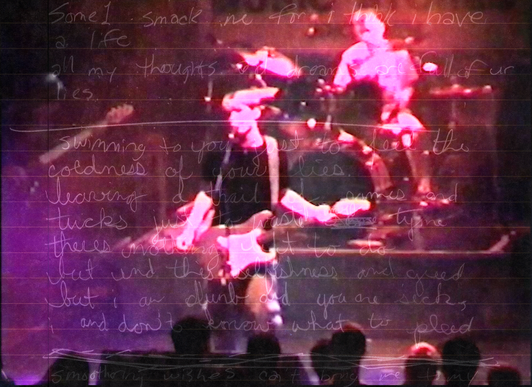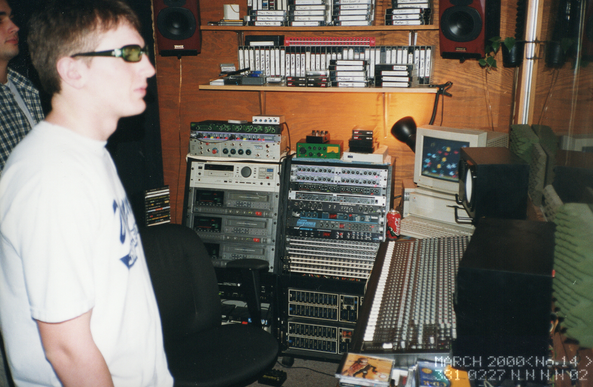Family Album by The Ullman Boys
Two generations of Ullman Brothers. One Band. 11 tracks—including my first new song in seven years, "How Loved You Are" and my dad's "Dream Lullaby" written for his grandkids. Link to your streaming service of choice above and/or download the album for free @ dreamingoutloudrecords.com. It's the 50th release on that site!
-
Jack & Diane
-
Small Town
-
1976
-
It's Five O'Clock Somewhere
-
One Headlight
-
Handle With Care
-
End Of The Line
-
Vertigo
-
Where The Streets Have No Name
-
How Loved You Are
-
Dream Lullaby
Backstory
Over the last 50 years, my dad, Jim, his younger brother Jack, myself, and my younger brother Brian have all introduced and respectively reintroduced music into each other's lives at key moments when we needed it most. The Ullman Boys' Family Album is the first recorded collection of songs created by these two generations of Ullman Brothers.
Born to deaf parents, my dad and his three siblings grew up in a house without music. Seeing The Beatles on The Ed Sullivan show in 1964 changed all that. Dad and Jack crafted cardboard band instruments and distributed the roles of John, Paul, George, and Ringo among themselves and a couple of other friends and began playing along to the fab four's records as a sort of lip-sync tribute group.
Before long, they graduated from cardboard cutouts to actual instruments. While brothers Duane and Gregg Allman were getting together with their pals in Jacksonville, Florida to form the iconic Allman Brothers Band in the mid-late 60s, Jim and Jack Ullman were recruiting their buddies to become The Bushmen in Rittman, Ohio.

The Bushmen (Left to right: Larry Griffin, Ronnie Osburn, Jim Ullman, Jack Ullman - with Gary Thompson, keys)
They covered the popular songs of the day, beginning with an impromptu performance of "Last Kiss" by J Frank Wilson and the Cavaliers at a street corner sock hop.
This detail is one of many surprising parallels in the paths of us four Ullman Boys I learned of during the five-plus-hour interview I conducted with them for this piece. Because of Pearl Jam's chart-topping cover of "Last Kiss" more than three decades later, I myself sang that same 1960s song in that same town square. You can actually see that moment about 53 minutes into a documentary I made called Steve: Finding Rhythm.
Here's what Uncle Jack remembered about The Bushmen's first gig...
JACK: I'd never played a set of drums in my life. [The previous band's drummer] left his drum kit for me up on the stage. We just got up on stage and started playing. I don't know how we survived the night, but it was amazing. And we became a mainstay in Rittman because of that.
Throughout their teens, The Bushmen (or sometimes "Bushman") played gigs at city parks, battle of the bands competitions, homecoming dances, the local swimming pool, and lunchtime performances in the high school gymnasium. My dad sang lead vocals and played guitar, Uncle Jack the drums, and their pals Ronnie and Larry bass and lead guitar.
JACK: Anything that was playing on the radio, we would try.
JIM: I'd learn the chords, learn the songs, teach it to the guys, and we played those songs. In the mix the whole time were the Beatles. And [eventually, we] moved into Motown. We wanted to play Four Tops and Temptations. The last few times we were playing as a band, we were playing Motown.

The Bushmen (Left to right: Jim Ullman, Jack Ullman, Bill Lawhorn, Larry Griffin)
The Bushmen disbanded after graduation. Dad went to college at Ashland University on a baseball scholarship and later got his degree from Bible College to become a church pastor. Uncle Jack enlisted in The Air Force, where he also played baseball. When he wasn't playing center field for the Ramstein Rams, Jack was playing protest songs by Country Joe and The Fish; Peter, Paul and Mary; and Joan Baez in the airmen's clubs.
He was hoping to get together a new group of musicians to play with him in Germany. When that didn't work out, Jack mailed the 12-string guitar he bought there to his brother Jimmy back in the States.
JIM: I used it to lead the church in worship. Normally, they always wanted a pastor's wife to play piano, [but my wife had] already spent 12 hours [a day] working with kids in public school. So I didn't want that. I didn't have any real guitar at the time, so when I got that 12 string, I put that thing to work. I wore that thing out.
Then I got an Ovation acoustic-electric and joined another church organization which specialized in worship through acoustic guitar. There'd be about four of us with acoustic guitars, playing songs, leading congregations in worship. I did worship seminars and things probably for six or seven years after that.

This is me right around my first birthday sitting in my dad's Ovation guitar case.
I came along in 1979. For as much as music was not a part of Dad and Jack's home life growing up, it dominated mine. One of my most constant memories is Dad playing guitar around the house, and I remember a lot of the worship music he led at church.
My dad started teaching me to play when I was nine. Seeing La Bamba and The Buddy Holly Story biography films inspired me to want to play those 50's rock 'n' roll tunes. Just like him and his brother with their Beatles records, Dad started me out with a cardboard guitar. Slinging that two-by-four necked, rubber-band-stringed ax over my shoulder, I'd mimic the mannerisms and performance style of Lou Diamond Phillips as Ritchie Valens. The first one he made me was modeled after his custom blue Fender Strat and can be seen in the back half of this 1988 VHS remake of La Bamba.
Another notable first appearance in that "Ullman Production" (as the opening preadolescent, hand-scrawled title card announces) is my five-year-old brother Brian portraying "Bobo," Del-Fi Records founder, and Ritchie Valens producer and manager, Bob Keane. Between this and a revised version we attempted a few months later, my little brother Brian would also play Ritchie's older brother Bob (and Buddy Holly!) with great glee—and an understandable amount of bewilderment at times, as I was feeding him the lines from memory out of the side of my mouth.
Brian caught the music bug in middle school. He started by plucking out simple bass lines from things like the Violent Femmes' song on The Crow Soundtrack and quickly moved on to fronting a four-piece rock band of his own and playing the same gymnasium The Bushmen had thirty years prior. In the two years chronicled in the Enormity Anthology (1996-1998) video collection, you can see the youngest Ullman Boy take his basement band from that small stage to capacity crowds at Cleveland's Odeon Concert Club.
I was mostly concentrating on making movies at that time. I even attempted to direct a music video for Brian's band. Though I lacked the skill to edit it together back then, I completed it for the Enormity: Live at The Odeon legacy release in 2018.
Though the frequency ebbs and flows, since 1988, music has always been a steadfast outlet for my creative expression. Before filmmaking became my focus in the early '90s, I channeled my passion for 50's rock 'n' roll sparked by those Columbia Pictures biopics into a series of cassette albums I recorded using first my dad's Panasonic RQ-2739 Slim Line Portable Cassette Tape Recorder and later my own prized Sony Sound Rider Dual Cassette Radio Boom Box. The Sony unit made it possible for me to overdub a harmony vocal like I'd learned in The Buddy Holly Story, or layer a lead guitar part over a rhythm track. Unfortunately, in a misguided attempt to "grow up" in middle school, I threw these tapes away. I do remember I used to spell my "stage" name, "Davyd Ulman," and I would draw the cassette covers modeled off of either Buddy Holly or Amy Grant tapes. I can also recall Dad doing the lead guitar solo for my version of "That'll Be The Day." The only two originals that linger in my memory are "Move Over Elvis" (sung to the tune of Buddy Holly's "It's So Easy") and a Beach Boys rip-off that included the lyric, "if you've ever been to California / then you know what I mean / the girls are cute, and the boys are mean." Whenever I'd get excited about a certain song, I'd ask Dad to teach me the chords. Eventually, I got to where I could figure things out on my own.
While Brian's group was winning studio time in battle-of-the-bands competitions, I was beginning to play a lot of Pearl Jam covers and relishing the outlet of belting out Eddie Vedder's emotive lyrics around the campfire with my friends. At home, Brian would often join me, filling in the spaces by playing the more complicated phrasings he was learning that complimented my open-chord strumming and imitative vocals.
The year 2000 was a pivotal period for the younger pair of Ullman Brothers. Brian was in high school, playing in two rock bands, and getting into home recording. In keeping with the fraternal framework laid out by The Bushmen in the 1960s, both of Brian's groups had at their cores a pair of brothers on drums and guitar. In Paradigm the Yoyo Crusade (which was an evolution of Enormity with a new singer), it was Matt and Mike Socrates, and in Circle Of Willis —the new band for which Brian was writing and singing—Zack and Cody Kelly. I was unwittingly breaking this tradition by being in a band in which no one was related, a folk/pop/didgeridoo quintet called STEVE. The STEVE saga is recounted elsewhere on my website, but it is relevant to The Ullman Boys' backstory in that Brian produced our album, In The Event Of Rhythm—the third CD he had a hand in creating that year.
Recording "Pilgrimaté" scene from the FINDING RHYTHM documentary.
In the above video expert from the previously mentioned, feature-length STEVE: Finding RHYTHM documentary, you can see a 17-year-old Brian talking about how he came to be involved in the recording, as well as watch him surprise our friend Jackson with an Ebow guitar approach to achieving the cello-like sound he was craving for the song.
Brian was no longer pretending to be a record producer, repeating, "cut! Try it again," for our home video La Bamba remakes. Though he had yet to graduate high school, Brian had already spent time in multiple professional recording situations with his bands and was developing a remarkable ear and musical acumen as both a player and audio engineer.
Unfortunately, the tumultuous transition from teenagers to twenty-somethings that brought an end to The Bushmen decades before also delivered a series of challenging disappointments to me and Brian as well. By the age of twenty, Brian's bands had all broken up, and he had returned home to Rittman after a short-lived stint at Ashland University—the same school our Dad attended until on April 6th, 1970, when as a starting shortstop covering second base, a runner slid into his leg wearing metal cleats, all but ending his promising baseball career. To hear him tell it, Dad limped around and still managed to play for Malone University in Canton a couple of years later, but it was never the same. By the end of 2003, I was six months married and poised to major in film studies at the University of North Carolina Wilmington. I'd been living in Raleigh, North Carolina with my fiancée for a few years, working at both a gas station/convenience store and UPS, all the while making notes for new songs when, in a shocking and heartbreaking turn of events, the life I was building there quickly fell apart, and I soon found myself limping back to Rittman to live in the family basement.
During this difficult time, both Brian and I immersed ourselves in music. Brian began pouring his creative energies into a recording project called Four Degrees North and running live sound for the Voodoo Night Club in Akron. I decided to process my divorce by making a record also. Dad cashed in an old life insurance policy he had taken out in my name through his job, and he gave it to me when I moved back home to regroup. He and I took the lump sum payout to the Guitar Center in Fairlawn, bought a Hawaiian Koa wood Martin DXK2 Dreadnought full-bodied acoustic guitar, and a Lexicon Omega Digital Recording Workstation. I ordered an ADK A-51/SC-1 Studio Twin microphone set online, cleaned out the basement, hunkered down, and began writing and recording the songs that would become my debut album, Dog Days.
"Martin DXK2" short film I made about the guitar that changed my life.
Brian and I ended up co-producing that record over a three-year period, during which I strengthened my voice and the songs by performing in area cafes and clubs as a solo act, and Brian sharpened his ears at The Recording Workshop in southern Ohio. "I call it my audio boot camp," he says, "since it was 12-hour days and I lived in a tiny cabin in the woods with four other dudes."
When we celebrated the release of Dog Days in February 2008 at Akron's Musica Concert Club, Brian both played guitar in my "Sad Bastard Band" and performed a set of his own as The Fascist Puppeteer. These were the days of MySpace, and Brian had been posting music under this cheeky, one-man-band production pseudonym that people seemed to love, especially his rap song parody, "Shit Son."
The CD release concert was surprisingly well-attended. Brian hadn't played a live show in ages, and his stealthy draw, combined with the audience I'd been building through the 130+ gigs I'd played in the area over the previous couple of years—plus some relentless promotion aided by a friend who was working in public relations at the time—lead to a crowded event that paved the way for us to continue putting together our own concert bills at that club for years to come.
"Secondhand" music video, filmed at the DOG DAYS CD Release show on Feb. 23, 2008
Uncle Jack lost his wife Debbie to cancer in April of 2008, and he, too, turned to music for solace, strength, and community. Jack got back behind the drums and began sitting in on jam sessions with other Rittman-area musicians his age including his old Bushmen buddies Ronnie and Larry.
When putting together the lineup for my next CD release show, I seized on the opportunity to reunite The Bushmen as the opening act and to do a few songs in my set with an "All-Ullman Band." This excerpt from a December 2009 press release captures the excitement I was feeling in the lead-up to the gig:
"Rehearsing with my dad, uncle, and brother for this show has been amazing. Music has always been a big part of our family. My dad taught my brother and I to play guitar when we were quite young, but he hasn't played as much in recent years. It has been so great working together like this. I sometimes jokingly refer to my music as 'Sad Bastard Songs,' but you should see the smiles on our faces during practice!"
It was a special evening for us. Wearing a Beatles ball cap, my dad led The Bushmen in a rockin' set of songs from the likes of The Rivieras, Eddie Cochran, Creedence Clearwater Revival, Eric Clapton, and (of course!) The Beatles—ending in a rousing rendition of "Wipe Out" with Jack drawing uproarious applause. Watching the OG Ullman Brothers step into their on-stage roles for the first time in my life was transcendent. Dad was squaring off with Larry for guitar-dueling stage shuffles, making middle-aged musician jokes, and peppering the setlist with tales of their group origins and poignant tributes to those who couldn't be in attendance. At the end of my set, Jack got back behind the drums, Dad threw on the bass guitar, and Brian joined in on lead for a couple of my originals before closing the mini All-Ullman-Band set with a crowd-pleasing cover of Neil Diamond's "Sweet Caroline".
December 19, 2009. Photos by Matt Jackson.
We followed up this reunion show with a couple of other area appearances, including one hometown tavern gig in Rittman that was so well attended that the bar actually ran out of beer!
In 2011, during the crowdfunding campaign to release my Light The Dark album on vinyl, we brought the "Evening With The Ullmans" show back to the Musica stage—twice. For the first outing, I joined Brian on bass for his set, and we closed out mine with an All-Ullman Band rendition of "The Clear Lake Medley" from The Buddy Holly Story with us all wearing matching Buddy Holly glasses. This was a real full-circle kind of moment for me, as these were the first songs Dad helped me learn as a kid; and instead of him taking the lead on "That'll Be The Day," it was Brian.
Every iteration of these family affairs upped the ante. In the outro of the Buddy Holly medley, I threw in a few phrases of U2's "Desire" that fit the same Bo Diddley beat of "Not Fade Away." This planted the seed for a four-song U2 set we'd harvest at the second show later that fall.
During that show, as was becoming customary, I invited members of my family to join me towards the end of my stage time. We started by playing an all-ukulele version of "Déjà vu," perhaps my best-known song, and one I like to change up each time I perform it by singing the lyrics of different pop songs over the end that fit the same melody as the guitar chords—everything from Joy Division's "Love Will Tear Us Apart" and Ani DiFranco's "Both Hands," to Journey's "Don't Stop Believing," and even Michael Jackson's "Beat It" fit the framework. As I began singing the words to "With Or Without You," the other Ullman Boys came out of the audience and took to their instruments alongside me to finish out the song. From there, we transitioned to a full-on U2 cover band playing "Where The Streets Have No Name," "New Year's Day," and "Vertigo."
We also amped up the reunion factor for that show by resuscitating Brian's middle school band Enormity for the night. For their first set in over 13 years, Brian, Nate, Mike, and Matt rocked a medley of their original songs, as well as some Muse, Tonic, Foo Fighters... And they brought the house down—just as they used to in the 90's—with Ozzy Osbourne's "Crazy Train."

The Ullman Boys, 2011 (Left to right: Brian, David, Jim, and Jack Ullman) Photo: Kyle Collins
I moved to Minnesota eight months later; and when it came time to tour for Light The Dark, we brought the reunion bands back together for the Ohio stop. This time we got the house engineer Jim Bethel to record a feed from the soundboard and ultimately released a condensed version of all three see sets (The Bushmen, my solo stuff, and Enormity) as An Evening With The Ullmans: Live @ Musica.
It was a night full of many memorable collaborations. The Bushmen played with their original bassist, Ronnie Osburn, which was a first for these reunion gigs. I'm extra glad to have captured that, as well as Dad's energized, John-Fogerty-infused vocal performance of CCR's "Green River." Uncle Jack surprised me by singing lead on a few songs from behind his drum kit. I didn't realize he'd been doing that! And though my living some 760 miles away precluded the requisite rehearsal time necessary for an All-Ullman set, Brian and I joined The Bushmen for their last song, an encore of our "Where The Streets Have No Name" cover with Larry Griffin spicing things up on pedal steel guitar. Brian helped me out with a couple of songs during my set, and I was also joined by my friends Zach and cellist Tara Hanish to play our respective duets from the Light The Dark album. Enormity brought the rock and the roll with kick-ass selections by Foo Fighters, Tool, Big Wreck, Black Country Communion, and Pearl Jam's "Even Flow"—with Yours Truly on vocals.
I debuted a new song that night called "French New Year" which lead to a collaboration with Brian called The Furious Light. To say Brian produced that album is an understatement. He played almost all of the instruments and built up the robust full-band sound I'd always wanted. In August of 2015, we teamed up with our friends Midland Uprising for a short run of rock shows in NYC, Chicago, Akron, and St. Paul.

Playing "French New Year," the last song of the last show of the 2015 tour. Photo: Matt Olson
Other than contributing music to two family weddings and a funeral, I haven't played or sang much since that Furious Light tour—though I did do a few quarantine performances from home in 2020.
Brian worked on three records that came out in 2015 and has kept busy with mixing and mastering work in the years leading up to Family Album, most of which can be heard on our Dreaming Out Loud Records website. He also lent his audio engineering expertise to—and regularly appeared on—the Long Walk Short Drink podcast I co-created in 2016.
Around this time, Dad and Uncle Jack had been getting together on Wednesday nights for weekly jam sessions with a rotating crew of Rittman-area musicians. This routine inspired what would ultimately become Jack's Friends & Family album, a project recorded, mixed, and mastered by his nephew Brian.
Midway through that production, Brian went into the hospital with heart failure. "I really fucked myself up pretty bad," he shares on Long Walk Short Drink episode 50. "The doctors basically said, 'if you keep drinking [alcohol], you're going to die.' When [you're given] an ultimatum like that, I think it's easier to make a choice because it's not much of a choice. All in all, I spent about a week in the hospital—or six days, but it felt like a week."
In addition to working on the Friends & Family project, Brian was also helping me with the 10th Anniversary remixed and expanded edition of our Dog Days record. These unfinished projects weighed on him while also contributing to a mounting sense of purpose.
BRIAN: I was sitting in the hospital and [the] Dog Days album was not mixed, and Jack's album was not done, and I had never published any [of my own] music. Those were things I was thinking about in the hospital bed at dark hours like, "I haven't done this, I haven't done that, [and] I'm going to fucking die!"
Although he had been writing, performing, and recording in both professional studios, as well as in his ever-improving home set-up for some twenty years, Brian's original music had never been commercially available beyond a couple of Circle Of Willis tracks appearing on limited edition compilations sold in Akron-area Best Buys.
BRIAN: There was definitely a time where I took a break from music. I [wrote] maybe a song a year, and that was a trend for a long time. But definitely, once it was threatened to be taken away from me, then I got really serious about it.
In 2019 Dreaming Out Loud Records released not one but two collections of Brian's music on all the digital platforms under his Fascist Puppeteer moniker: Mix Tape and Practicing Synthesis.
Our Dad also struggled mightily with his heath in the decades leading up to the recording of Family Album. He's survived two heart attacks (and the quadruple bypass operations that went with them), a stroke, and five neck surgeries—the last of which left him with a paralyzed vocal cord. This made it difficult to breathe comfortably without coughing and definitely made singing a challenge.
Seeing his brother struggling at the Wednesday night jams and his nephew fighting to regain his physical and spiritual strength, Jack took decisive action— just as he had in the 1970s when he mailed that 12-string guitar he'd bought in Germany to his then-guitarless brother Jimmy back home.
JACK: We was out there playing music, and one of the guys rudely took my guitar away from me to play [a song]. And then I said, "Well, I'll accompany. I'll just play the drums while you're doing your thing." I was trying to be the nice guy, and the guy says, "No, I don't need your help." I decided right then, "Okay, this guy doesn't need help. Brian needs more help than anybody in this room." So I packed up that drum kit, I drove it straight over [to Brian]. I said, "here's the first thing that's going to start your studio. Next thing is, we're going to start recording music. Next thing we're going to do, we're going to expand this." And we've done those things quite well, I think, and his health has gotten better.
BRIAN: He's like, "I'm giving you this Martin guitar and I'm giving you this drum set." And I'd just torn down my queen-size bed. So I gained this space in my room. And then it was like, "Whoa, I guess things are changing. I guess there's a nine-piece drum set coming to the house!" But just as he gave the [guitar] to dad, he did the same gift to me in his Martin guitar, and his drums, and his microphones, and allowed us to start making these full-band recordings. And yeah, it's just amazing how it's all come around as individual gifts to each other through different circles of time.
The first time this guitar-gifting motif occurred was back in the 60s when Jack and Dad's "Uncle Scotty" Milum left a Harmony guitar at the Ullman house on Wayne Street in Rittman. It was then, before that guitar was ultimately repossessed, that Dad began learning to play.
_crop.png)
My Great Grandfather, Cecil S. Milum
JIM: [During The Great Depression,] The Milums lived in such unbelievable poverty that half the house didn't even have a floor. It was a dirt floor! My grandpa was a railroad engineer. He worked on the railroad, but they didn't have any money. What we are understanding now, as we look back, what they did have was music.
BRIAN: The Milums had the music. That's where the music came from, and ours is genuine. It's down to the soul.
Family Album is a testament to that legacy; and thanks to the ongoing, intergenerational exchange of musical inspiration from brother-to-brother, The Ullman Boys have persevered. By the time the record was finished, Uncle Jack would himself suffer a heart attack and spend time in the hospital, and of course, we would all be waylaid by the seismic impact of a global pandemic and an intensifying period of social upheaval. Through the carefully selected cover songs, and later with the additions of my tune "How Loved You Are" and Dad and Brian's "Dream Lullaby," The Ullman Boys are singing and playing their way through loss, heartbreak, health crises, life lessons learned, and relearned.
BRIAN: I can't think of another group of brothers of different generations having made a collection of music. They're in their seventies, approaching seventies, and we're in our forties, approaching forties... It's just amazing. During these tremendously hard times against humanity, I just can't believe we're doing it. It's a tremendous victory for hope.
JACK: It tells a little story. I think it says a lot [about] who we are, what we've learned, where we want to go, and the legacy we leave behind. It means a lot to me.
JIM: I see genuine growth, especially letting it be your project and Brian's project. Instead of being a cover band, you guys are actually putting your artistic strokes on it. The crayons are not telling the artist how to paint, and I really appreciate that.
Coming from a family of deaf parents, we know what it was like to live in a house where music was not a part of our lives. You have to live that life to understand it. [Jack and I] did live that life, and this is a reminder to me of how it's all built up to, when I look at you guys and say, "I did have a part in that."
It's nice to see that we got two guys that are gifted, that are carrying it the right way. You're not full of yourselves or any of that stuff. You have genuine, amazing talent that because of where you're at emotionally, physically, and spiritually, a lot more people are going to enjoy what Jack and I have planted and what we've done. And that's quite a legacy.
And the legacy will continue. When I spoke to Dad, Jack, and Brian for this article, they were already psyched about the work they've been doing for "Album III."
JIM: The new stuff that's coming out on the next album is so good. I'm shocked. Shocked!
BRIAN: We plan on doing harder songs.
JIM (to me): And so do you. You just don't know it yet!
—David Ullman, June 2022



